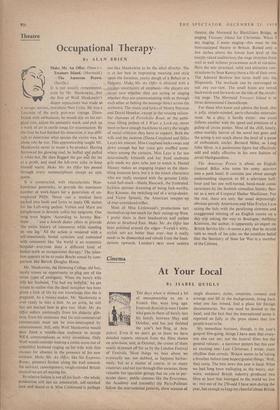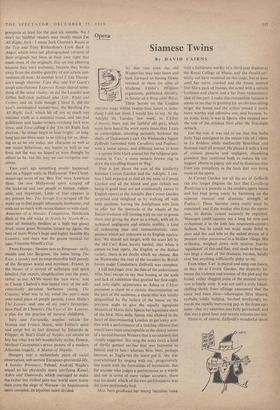Cinema
At Your Local
By ISABEL QUIGLY
THE days when it showed a bit of oneupmanship to see a French film went long ago. Festivals flourish (a man I know who goes to them all barely sees his family between May and October, and has just finished the year's last fling, at Aca- pulco). Even if we don't go to them we have detailed reports, extracts from the films shown on television, and, in October, the cream of them neatly skimmed off for us by the London Festival of Festivals. Most things we hear about we eventually see; not dubbed, as happens barbar- ously, but as a matter of course, in so many countries; and not just through film societies, those valuable but specialist groups that tie you to par- ticular dates: public cinemas like the Everyman, the Academy and (recently) the Paris-Pullman follow the international patterns, show seasons of
single directors, styles, countries, connect and arrange and fill in the backgrounds, bring back what one has missed, find a place for foreign documentaries. No one need be limited to the local; and the fact that the international scene is reported so fully in the press shows that few people want to be.
My immediate business, though, is the year's genpral film-going, things I have seen that every- one else can see; not the festival films but the general releases : a narrower pattern but this year an exciting one.. Last Christmas I wrote, more sibylline than certain, 'Britain seems to betaking a breather before (one hopes) greater things.' Well, they came. The best news this year is local. What we had long been walloping as the weary, out- worn, outdated British industry produced two films at least that belonged to the world we live in : two out of the 250-odd I have seen during the year, but enough to keep me cheerful about British
prospects at least for the past ,six months. No I don't (as faithful readers may recall) mean /'m All Right, Jack: I mean Jack Clayton's Room at the Top and Tony Richardson's Look Back in Anger, which were not photographed versions of their originals but films in their own right that made more of the originals, that set one cheering because they were authentic, because they broke away from the shabby-gentility of our screen con- ventions till now. At another level J. Lee Thomp- son's tough charmer Tiger Bay and Val Guest's tough anti-charmer Expresso Bongo shared some- thing of the same vitality; so.did the Launder and Gilliat half-cock political joke Left, Right and Centre; and so, little though I liked it, did the year's sociological wonder-boy, the Boulting I'm All Right, Jack, which hit off not so much any national truth as a national mood, and has had politicians and leader-writers invoking Jack ever since, and Time calling it the All Right Jack election.' So things begin to look bright : at long, long last our films seem to be talking for us, show- ing us as we are today, our character as well as our social behaviour, our hearts as well as our lives, not the way we hoped or were thought by others to be, but the way we can recognise our- selves.
Two years ago something similar happened, and on a bigger scale, in Hollywood. Two Christ- mases ago seven of my 'Best Ten' were American films; the new Hollywood spirit scraped off the make-up and saw people as human, vulner- able, and important. Little of that appears in my present list : The Savage Eye scraped off the make-up to find people inhumanly loathsome, and ends not so much with reconciliation as with slush; Anatomy of a Murder, Compulsion, Hitchcock back at his old tricks in North by North-West, were all basically thrillers at a high but glossy level; some good Westerns turned up again, the best of them Wyler's huge and highly likeable Big Country; and there was the gayest musical for ages, Vincente M inelli's Gigi.
From Europe : Sweden sent us Bergman: early, middle and late Bergman, the latest being The Face, a spooky and incomprehensible half-parody of the Bergman world and mystique; France, in the throes of a revival of technique and spirit labelled (for export, simplification and the press, rather as our AYMs were) the 'new wave,' sent us Claude Chabrol's thin-lipped view of the self- consciously decadent Sorbonne young, The Cousins; what was to my mind the year's most over-rated piece of purple passion, Louis Malle's The Lovers; and, one of my year's favourites, Jean-Paul de Chanois's The Case of Dr. Laurent, a plea for the practice of natural childbirth.
Italy sent Fortune/la, another vehicle for Masina and Franca Marzi, with Fellini's spirit and script but in fact directed by Eduardo de Filippo; de Sica's Gold of Naples, cut almost to bits but what was left wonderfully stylist; Greece, Michael Cacoyannis's grave picture of a modern Athenian tragedy, A Matter of Dignity.
Hungary sent a melancholy piece of social observation, sub-section European-provincial-life, A Sunday Romance; Poland, Andrzej Wajda's sequel to his physically more terrifying Kanal, Ashes and Diamonds, which managed to make the rather less violent post-war World seem worse than.even the siege of Warsaw—its hopelessness more complex, its loyalties more divided.



























 Previous page
Previous page